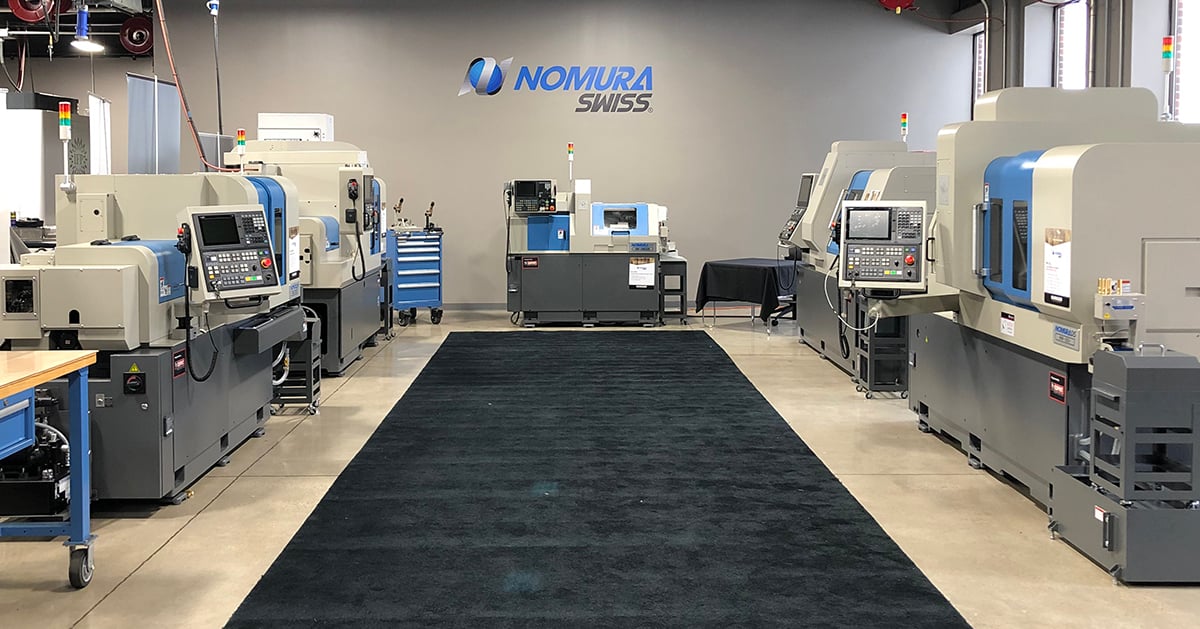Swiss-type lathes excel in high-volume environments and can machine small, complex parts up to 30% faster than their traditional counterparts. Swiss machines boast high tooling capacity and the ability to machine on eight or more axes; this boosts production by eliminating secondary operations and increasing throughput. If you've determined Swiss to be a good fit for your shop, how do you decide which machine to pick?

Part Complexity
More part complexity means more tooling requirements. Swiss machines save in-process time by having tools close together and able to access the part immediately. Swiss Machines with a B axis can machine multi-sided parts in a single setup; the NN-20J3XB from NomuraSwiss is available with a double B axis, allowing extra work on the sub-spindle
It doesn't stop there. Machines such as the NomuraSwiss NN-32DB offer 3-path tooling, with two independent tooling arrays at the main spindle and one on the sub-spindle. This machine is specialized for difficult-to-cut parts.
From simple parts to highly complex parts, a Swiss machine can provide too little or too much, so reach out to your Nomura Representative to make sure the machine you choose best fits your needs.
Barstock Size
The size of your barstock will determine the size of the machine. NomuraSwiss offers Swiss-style CNC machines for parts from 3mm to 38mm in diameter. If you have a variance of part sizes, you can use the same barstock to run all your parts on a single machine, regardless of the end size of the part. Larger stock lends to more stability; therefore, a bigger machine may be a better choice.
Machine Rigidity
A machine's stability and rigidity play a critical role in tool life, surface finish, and tolerance over time. Longer tool life means less money spent on tooling replacements. If you don't attain a fine surface finish in the first setup, you haven't eliminated secondary operations, thus detracting from the benefit of switching to Swiss. Our Swiss turning machines maintain a world-recognized rigidity with reduced vibration and high accuracy, which extends tool life and reduces chatter, resulting in a clean surface finish every time.
The extreme rigidity of a NomuraSwiss comes from three main factors:
Hand-scraped ways
Master artisans painstakingly hand scrape grooves into the machine ways. These grooves create pockets to trap oil and air, reducing friction and decreasing the potential for machine wear and vibration.
Dovetail Structure
The dovetail structures in a Nomura's machine ways further enhance the machine's rigidity through precise contact.
Integrated Casting Bed
Unlike most Swiss-style lathes with a detached-type bed, NomuraSwiss machines sit on an integrated casting bed, which offers shock resistance and temperature stability. This difference helps to minimize heat deformation and machine vibration and increase machining accuracy.
Tolerance
Reaching a tight tolerance is one thing, but maintaining that tolerance over a long period sets NomuraSwiss apart from more familiar Swiss brands. NomuraSwiss machines can sustain a tolerance as tight as 0.0001in from the first part to every part after it.
The process stability of our Swiss-style lathes allows lights-out manufacturing in a high-volume environment. Machinists can leave a NomuraSwiss running overnight and expect it to hold size with no variance.
The NomuraSwiss Advantage
NomuraSwiss machines offer more stability and rigidity than other Swiss machines due to their design. Our experts can help you determine the best machine to fit your parts, and our machines will help you hold size longer than our competition. Ready for Swiss?



